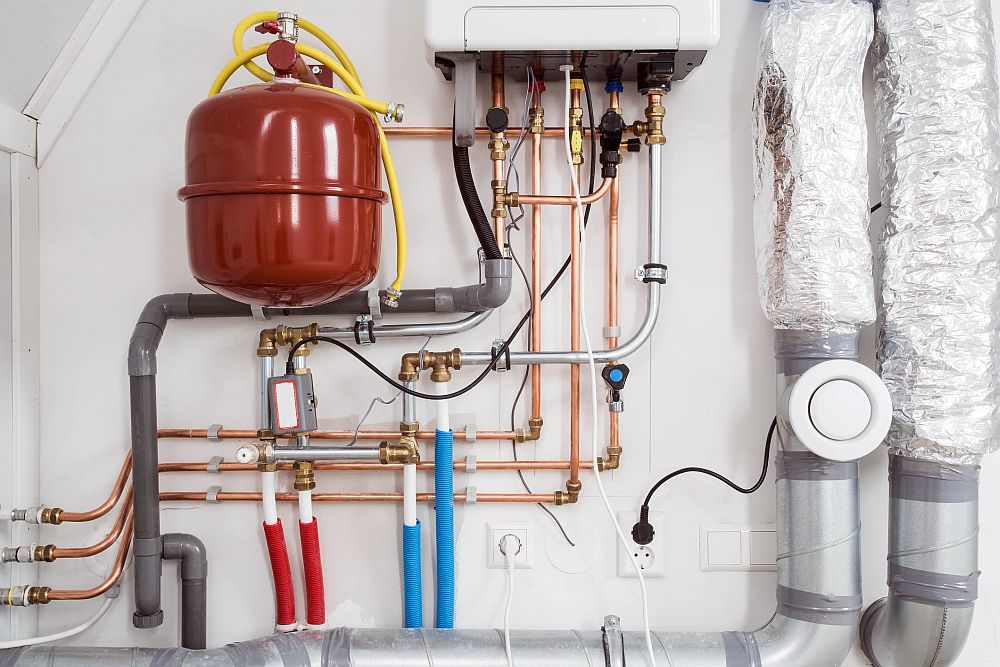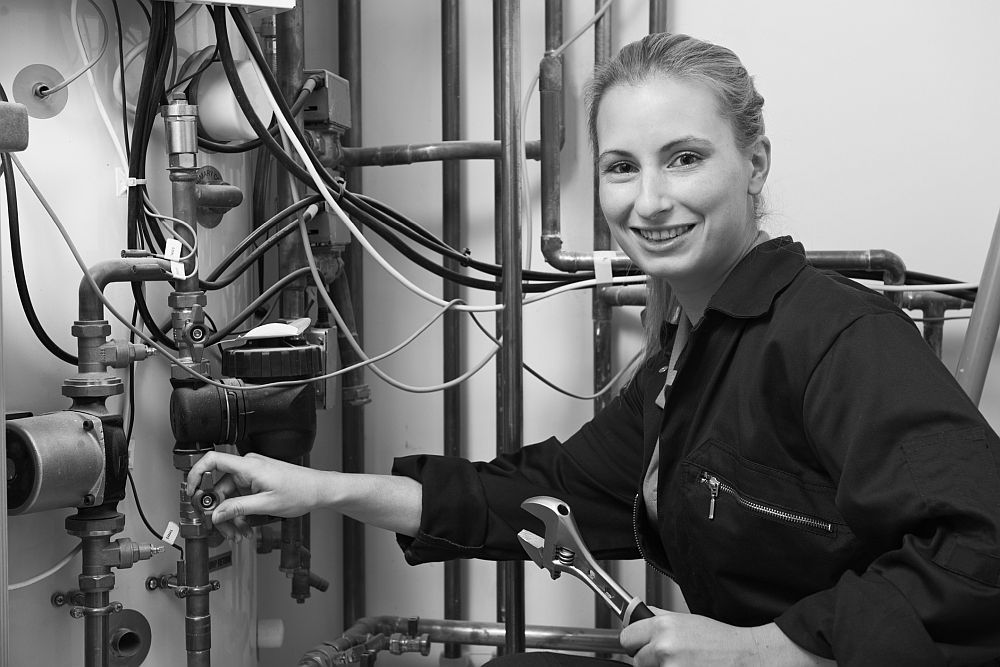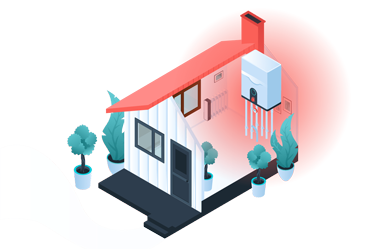14 Heating and Boiler Problems Explained (and Fixed)
Having central heating or boiler problems?
1 in 5 boilers break each year. Many of these boiler issues could be avoided by early troubleshooting, an annual boiler service, and putting some preventative measures in place.

Our 3-minute guide will cover 14 of the most common condensing boiler problems, and what you need to do next.
These are heating and boiler problems that occur with all major brands, including Ariston, Baxi, Glow-Worm, Halstead, Ideal, Alpha, Viessmann, Vaillant, and Worcester, among others:
- Boiler Keeps Switching Off
- Boiler Is Losing Pressure
- The Boiler Leaks Constantly
- Noisy Boilers
- Boiler Makes a Loud Bang When It Fires Up
- No Hot Water, but Central Heating Works (or vice versa)
- No Heating or Hot Water
- The Boiler Works, but Radiators Won’t Heat Up
- Water is Far Too Hot
- Boiler Lockouts and Condensate Pipe Issues
- Radiators are Cold at The Bottom, Middle or Top
- Boiler Controls are Not Working Correctly
- Kettling Noises
- Pilot Light Keeps Going Out
Safety Note Regarding Boiler Problems and Repairs
If you’re experiencing boiler or central heating problems, you should get a quote from a Gas Safe registered engineer to start the troubleshooting process. Working on a boiler without a Gas Safe engineer is a dangerous activity that could jeopardise the health and safety of your family, or other residents on your property.
To see if replacing your boiler is the most cost effective option, you can get a fixed price online for a new boiler on Heatable’s website — they have excellent deals on Worcester’s new boiler range, and other top boiler brands. All you need to do is fill in an anonymous questionnaire about your property, which shouldn’t take more than 90 seconds.

14 Heating and Boiler Problems: Causes, Fixes, and More
If your central heating is not working or you’re experiencing boiler problems, don’t panic! Instead, have a quick look at our list of the 14 most common boiler issues.
1. Boiler Keeps Switching Off
One of the common boiler problems we face (almost weekly), when a boiler fires up, then turns off right after. The central heating starts, then stops, with the cycle likely repeating itself every few seconds or minutes.
Why a Boiler Fires Up Then Turns Off
Boilers are fitted with various fail-safe mechanisms that activate and cause a boiler lockout in certain harmful scenarios. For example, if a boiler is not sufficiently pressurised, heating system problems — like leaks — may be the root cause. To prevent ongoing system leaks, the boiler locks itself out until you resolve the underlying issue, i.e. fix the leak and repressurise the boiler.
So, if your boiler seems to be “randomly” switching itself off — or “locking out” — it’s likely due to one of the following reasons:
- The boiler is losing pressure
- Low boiler pressure
- The thermostat is not operational
- The pump is leaking or broken
- Valves are closed not allowing water into the system
Prefer a replacement over a repair? Jump over to Heatable and get a fixed price on screen, in less than two minutes.
2. Boiler Is Losing Pressure
Loss of pressure is one of the most common boiler problems. You can read our in-depth guide to the causes behind boilers losing pressure here.
A question we frequently get is whether a boiler can lose pressure with no leaks.
The answer is–no. Actual pressure loss is always caused by a leak, however small it may be. You just might not be able to see where the leak is.
Now, if your pressure gauge constantly drops overnight, one of the likely reasons is:
- The pressure relief valve (PRV) is not working correctly.
- The auto air vent is broken and losing pressure.
- There are leaks in your system. These could occur on towel rails, radiators, rad valves, or pipework.
- Your radiators are full of air.
- The expansion vessel is faulty.
- Old joints have degraded and are leaking.
- The pressure gauge on the boiler isn’t working correctly.
If you’re observing the low boiler pressure only when the heating is on, that’s a sign of a tiny leak. In this scenario, the excess pressure caused by increased heat strains the damaged component, causing it to leak when it wouldn’t do so otherwise.
If your boiler loses pressure even when the heating and boiler is off, you’ve got a larger leak on your hands.
3. The Boiler Leaks Constantly
A lot of the time, boiler leaks are superficial and are unlikely to cause significant damage.
However, we’ve been called out to properties where a small boiler leak had ended up corroding parts, leading to expensive repairs. Even worse, if the water gets into the boiler’s PCB (Printed Circuit Board), which typically costs £400-500 to fix, the best option may be to get a complete boiler replacement.
Below, we’ve listed most boiler problems that lead to leaks:
- Expansion vessel diaphragm has degraded.
- Cracked heat exchanger.
- The heating pump is not secure.
- Blown heating pump seal or gasket.
- Boiler leaks when it rains, because water is entering via the flue.
- The filling loop is leaking.
- Pipework connected to the boiler is not soldered/installed correctly.
- The pressure release valve has failed.
- Internal parts have corroded and are now leaking.
You can see an in-depth article on boiler leaks here.
What kind of fuel does your boiler use?
Fixed price online with next day installation
4. Noisy Boilers
As boiler parts degrade, resulting boiler problems can cause banging or gurgling noises.
Central heating pumps are one of the main reasons these noises occur. Over time, they can accumulate air, which results in an airlock.
Luckily, this boiler fault is easy to fix.
To remove an airlock from a central heating pump, simply locate the pump behind the boiler casing. There is a small bleed screw that’s designed to let air out. Once the air stops hissing and a trickle of water comes from the bleed screw, the airlock should be gone.
Got a problem with boiler noise? We’ve created a guide to noisy boilers here.
5. Boiler Makes a Loud Bang When It Fires Up
Does your boiler make a loud bang when it starts up? Possibly like a small explosion? Well, there’s a good chance it is an explosion.
Listen carefully just before your boiler starts up. When you turn the heating on, the boiler will try to ignite. If it doesn’t ignite after 3 attempts, it will probably lock out.
However, if it manages to fire on the 2nd or 3rd attempt, there’ll be excess gas in the chamber, left over from the unsuccessful attempt. The ignition is now lighting much more gas than it needs to, hence the mini-explosion and bang.
The fix is usually a replacement ignition burner; this part wears out and breaks over time.
6. No Hot Water, but Central Heating Works (or vice versa)
This is one of the common boiler problems with older units, and there is usually one culprit: the diverter valve.
The diverter valve alternates your boiler’s operation between hot water and central heating modes. If you’re running a tap or shower, the valve will prioritise hot water over central heat. Once you turn these fixtures off, it then supplies heat to the central heating system.
The valve may get stuck over time, mainly due to debris and sludge build-up. When this happens, it will either stick on the heating or hot water mode.
If it sticks on the heating side, you’ll only get lukewarm water at best. Conversely, if the valve is stuck in hot water mode, you’ll observe that your central heating is not working, but hot water is available when you open the taps.
We’ve covered some useful points that can help you troubleshoot a faulty diverter valve here.
Spare kits are available for diverter valves to fix this heating fault, but as the unit is already worn, it’s worth looking at a full replacement. You can get a price on-screen in less than 90-seconds here.
If you’re still struggling, check out our guide to no hot water.
7. No Heating or Hot Water
Most central heating systems will use a boiler that has a motorised control valve, sometimes called a mid-position or Y-plan valve. Valves are prone to failing and when they do, they get stuck. If you have no hot water and notice the heating not coming on, then this could be the issue.
Get a heating engineer to check that the valves are operating correctly.
There’s a full guide on what to do when you have no hot water here.
8. The Boiler Works, but Radiators Won’t Heat Up
If the boiler is firing up, that’s a good sign. However, if the radiators are not heating up at all even with the boiler running, there may be a few common culprits.
The first part of the troubleshooting process will focus on the pump. Old pumps are prone to seizing, and when this boiler problem occurs, hot water will not be directed to any radiators, taps, or showers.
Giving the pump a gentle tap can sometimes free it up enough to get it working again. However, it’s likely that its approaching the end of its service life, and you’ll probably need to replace it soon.
However, before you replace the heating pump, try bleeding all radiators and towel rails — large pockets of air in a heating system can stop it from working, and this simple issue definitely doesn’t warrant a replacement.
If they radiators are hot at the bottom and cold at the bottom, there’s a good chance your system is clogged with heating sludge.
9. Water is Far Too Hot
If water is coming out far too hot, then you may have a thermostat issue — the thermostat thinks the water is much cooler than it is. If your central heating system uses a hot water tank or cylinder, the cylinder thermostat is the likely culprit.
A new thermostat will fix this heating problem.
However, if the water is coming out far too hot from your shower, the thermostat probably isn’t too blame. The cartridges in showers are prone to failing. If they have failed whilst set on a hot setting, it’s likely that they are stuck there. In this event, simply replace the shower cartridge.
10. Boiler Lockouts and Condensate Pipe Issues
Hopefully, you have your boiler manual on hand.
If you are finding that your boiler problem keeps locking out, there should be a fault code on the PCB display. Cross check the fault code with your user manual — many boiler lockouts are associated with condensate blockages.
All boilers now must be condensing, which means they catch all the acidic water and waste gas that the boiler produces. Once these byproducts collected, they get distributed to an outside draining system, so that no harmful gases remain on your property.
The problem is that the condensate pipe that takes the water and gases out of the property is incredibly narrow. In the winter, this means it’s prone to freezing. All other times of the year its prone to developing small blockages.
Luckily, a frozen pipe is extremely easy to unblock. All you have to do is get some warm water and pour it over the pipe until it thaws out.
If it’s just a small blockage, try removing the pipe, flushing hot water through it, and then reinstalling it. In the event that this doesn’t work, all plumbing merchants stock condensate pipes — a replacement is going to be in order.
And if you’re still having problems, checkout our guide to boiler lockouts here.
11. Radiators are Cold at The Bottom, Middle or Top
If your radiators are not heating up correctly, it’s important to check which part of the radiator isn’t working. A common issue we come across is that new radiators have not been balanced correctly. Balancing radiators ensures the right amount of hot water reaches each radiator to give an even distribution of heat.
Top of Radiators Won’t Heat Up
If radiators won’t heat up correctly, or the heat on the radiators is patchy, this usually signifies that there is air trapped in the system.
Using a radiator bleed key, open the air vent (very slowly, and probably less than a quarter of a turn). When the air stops hissing and the water starts dripping, the radiator is bled. Do this on every radiator and towel rail in the house.
Middle & Top of Radiators Won’t Heat Up
This boiler problem relates to a build-up of debris (mainly sludge) in your central heating system. This sludge build up will damage all parts in the heating system, including pumps, heat exchangers and even the radiators.
If you’re finding the radiator is cold but the pipes are hot, even after bleeding, sludge is the likely problem.
You have a few options:
- Hot flush (run chemicals through the system at normal flow rate and pressure).
- Power flush (a pressurised hot flush).
- Replace radiators that have sludge build up.
Once the radiators have been fixed, it’s important to install a boiler sludge filter.
Magnaclean and Fernox are two good brands of boiler sludge filters to consider.
12. Boiler Controls are Not Working Correctly
A common boiler problem we’ve come across is malfunctioning controls, such as thermostat issues, a faulty mechanical timer, or a broken frost thermostat. Here are some boiler problems that may point to an issue with controls:
- Your boiler turns on and off when it’s not meant to.
- The temperature seems much hotter or colder than the thermostat shows.
- Thermostat is not clicking.
- Thermostat or mechanical timer is buzzing.
- Radiator valves are not increasing or decreasing temperature according to their setting.
- Water is coming out far too hot.
In many cases (if you don’t have a wireless or internet thermostat/programmer), it’s much cheaper to replace the boiler controls than to repair them. Most quality boiler cover plans include controls repairs and replacement. If you haven’t got a boiler care plan, expect to pay £100-300 to install new controls.
Check out this guide if your boiler timer isn’t working.
13. Kettling Noises
If your noisy boiler sounds like a kettle, your problem likely relates to sludge and limescale build-up in the boiler’s internal components. But what is boiler kettling, really?
Sludge is an accumulation of debris, which, along with limescale, may clog up the boiler’s parts and cause the water to actually boil — which leads to the “kettling noise” you hear. Whilst all boilers are susceptible to sludge accumulation, you’re more likely to also experience limescale build-up if you live in an area with hard water. You can see the different hard water areas in the UK here.
It can be extremely hard to remove scale from the boiler once it builds up. And unfortunately, it attaches itself to expensive parts, such as the heat exchanger. If the parts can be salvaged, make sure you fit a scale reducer to stop further build-up and kettling.
14. Pilot Light Keeps Going Out
If you’ve observed that the pilot light on your gas boiler keeps going out, phone a Gas Safe engineer straight away. Since this fault typically relates to gas supply, it could be extremely dangerous.
Here are some problems that may cause a faulty pilot light on a gas boiler:
- An issue with your property’s gas supply. For example, if your gas supplier has disconnected you from the gird altogether.
- The pilot light could suffer from carbon build-up, which tends to happen over time.
- If it’s extremely windy outside, wind could be entering the flue and blowing out the pilot light.
- The thermocouple might be faulty.
In either situation, calling a Gas Safe engineer is your best and safest option.
Want a quote for a new boiler? You can get one on-screen in less than two minutes using Heatable’s installation quote form.
Boiler Problems: Conclusion

Heating and boiler problems come in all shapes and sizes. Many faults can be rectified without replacing the boiler, so it’s important to go through the proper troubleshooting process. If your heating and boiler problems are not covered in this article, please leave us a comment below and we will answer as soon as possible.

A bathroom radiator is hot at bottom and warm to cold at top. Rad is old. Bleed valve is a square set inside a square
hole inside a six sided nut 3/4 inch across flats. I don’t have a tool which fits the valve. If I loosen outer nut with a wrench will that release air in same way as via the valve? Thanks/regards.
That will work, just be careful you don’t open it too much.
If that doesn’t help, you should check out this: https://heatingforce.co.uk/blog/central-heating-sludge-build-up/
Our new bungalow has a central heating and hot water system that when filled and working loses pressure at about 0.5bar per day. When shut down and wet pressure tested it also loses pressure and leak cannot be found but when drained and air tested the pressure does not drop – any ideas? please. There are no damp patches anywhere.
Hi Michael. Might be an expansion vessel/PRV issue. Have a quick look here and let me know if that helps: https://heatingforce.co.uk/blog/boiler-leaking-water-from-bottom/
I have a Potterton Profile 80e boiler installed c.2000. It works perfectly well i.e. fires smoothly and generally has performed excellently over the years, with regular service. But recently I have noticed a clanging or expansion noise which comes up twice or thrice over a period of a few minutes of starting from cold only after it has been off for some hours and this disappears completely after that and the boiler then works perfectly. The system is a gravity CH system with a Grundfos CH pump. I am a layman and have have no knowledge of CH systems. Bleeding of the pump by a gas safe engineer whom I got to look at it indicated no air and he was not able to put a finger on what the cause was except to say ‘do not worry about it and there is no danger’. While he was here the noise appeared just once or twice after which there was none until the boiler was left unused for several hours. Radiators are bled whenever required. I wonder whether anybody has experienced this and if so how it was overcome. I would be happy to get a gas safe engineer look but would like a resolution rather than paying out to end up with no proper diagnosis and remedy. Thanks.
Hi. Sorry to hear about the problems you’re having. There’s a quick guide here that covers all aspects of a noisy boiler. Hope it helps! https://heatingforce.co.uk/blog/noisy-boiler/
My Baxi80, installed 2004, locks out after a length of time,a number of hours, normal operation. The next morning it comes on using MAN on the remote thermostatic control and repeats this process every day- without fail over a week now.
Gas and water pressure are ok. What possible causes are there for this?
Hi Paul, any chance you could check the thermostat?
I have a Worcester bosh combi boiler that for some reason when the heating is on it will stop heating when you run a tap weather its the hot or cold
Sounds like a problem with the pump? Had this checked?
My Worcester boiler has a wireless Salus thermostat and receiver. The receiver has started staying on when the thermostat is not calling for heat. We’ve changed the batteries in the thermostat, reset the boiler, but it’s still doing it. Can you advise please?